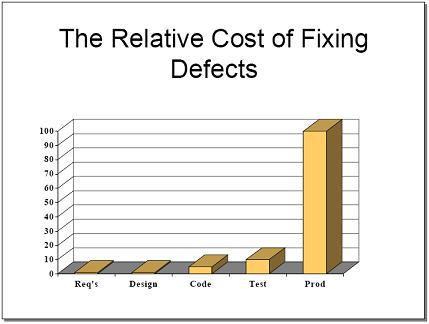There has a bunch of talk recently on blogs and in the open spaces at CodeMash about what other industries or professions we can compare software development to. The point of this was to look at these other industries and see what we can learn from them and how their practices can be applied to software development, particularly in the area of quality.
The title “software engineer” is frequently used to describe software developers. Let’s look at what an engineer in another discipline, civil engineering, might go through in their career.
Building a bridge leaves very little margin for error. Numerous people are involved in the construction of a bridge, including civil engineers, who will design the bridge, ensure that it will be safe, be able to handle winds and earthquakes, and on and on.
How did the civil engineer get to this point? He or she probably spent 4 years in college, then at some point had to study to take the PE exam, and probably went through extra study and training to learn the intricacies of bridge construction. That’s a good amount of training.
Quality is of the utmost importance to a civil engineer for obvious reasons – when you drive across a bridge, you expect to make it to the other side. If a civil engineer builds a bridge that fails, he is going to be in big trouble for that mistake, possibly to the point that he loses his job (if the offense is egregious enough).
In our discussions, the title that we preferred over “software engineer” is “software craftsman”. What’s the difference?
A craftsman might go through a different kind of training, and the work is slightly different. Take a carpenter for example. A carpenter will probably go through some sort of schooling, and then do an apprenticeship with a master carpenter. If he is good enough, eventually the apprentice will learn enough to become a master carpenter himself.
Let’s say that our master carpenter is building kitchen cabinets. There are certain basic design principles that he will follow, and he will be as precise and accurate as possible. You expect your cabinets to stay attached to the wall, you expect the doors to be on straight, and you expect the shelves to hold 20 plates and 15 bowls without collapsing. At the same time, there is an aesthetic element to kitchen cabinets, which is the criteria that you probably look at the most when you go to the store to buy kitchen cabinets.
Let’s compare the software development industry to these two disciplines. The average software developer goes to school for 4 years. Personally I think that university Computer Science programs are a joke (at least in the U.S., can’t speak for other countries). In my 4 years at the U. of Toledo I think I had 5 classes that taught me something relevant to real world software development. The words “unit test” were never uttered in my classrooms <shudder>.
Once the developer graduates from college, he immediately gets a job in the workplace and starts working on projects. In my case, I had 5 relevant classes in my 4 years, which equates to about one semester. This developer may receive little or no formal training after this for the rest of his career. Over the course of his career, this developer will write sub-standard quality code, but he’ll continue to get his standard raise every year and might even become a manager someday. Trust me, I have seen it happen.
Are we surprised at the quality of the software that is being written based on this analysis? A civil engineer builds a bridge that collapses, and he will probably not build another bridge again. If a carpenter builds cabinets using shoddy materials that don’t hold up, and no one will buy his cabinets. A software developer writes poor quality code, and he’s on the new team a few years later that is rewriting the legacy app in a different language.
There are so many problems here that I don’t even know where to start. You may not know everything about software development, and that’s fine. But there is no excuse for our lack of quality in our industry.
Let’s look at one area — testing.
Many developers would agree that unit testing and test driven development are good ideas. Even people who aren’t good at testing or TDD would say that. If you’re one of those people, learn how to do it! Ideally, find someone you know that knows how to do it and pair program with them for a week and you’ll be on your way. If you do know how to test, stop cheating and write your tests!
We’ve all caught ourselves cheating. We know that we should write tests but for whatever reason we don’t do it. That’s not holding yourself accountable. You are sacrificing quality, period.
Are you an aspiring Software Craftsman?
A software craftsman has a higher standard. A software craftsman cares about his craft and takes pride in doing quality work that will stand the test of time. A software craftsman does not cut corners or do shoddy work just to cross something off their to do list. Is that your standard?


